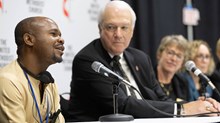As New Year's resolutions face their first weeks of testing, the Barna Group has released a new study on the "changing state of temptation" in America.
The study, which examines "America's favorite sins" and defenses from them, notes new temptations created by technology–such as "spending too much time on media" (44%)–as well as Western-specific temptations such as procrastination (60%) and worrying (60%). But the focus is more or less on the traditional "seven deadly sins."
Most interesting are the differences in admitted temptation based on religious identity. Protestants are tempted more than Catholics (or Americans in general) by eating too much (66% vs. 44% vs. 55%). By contrast, Catholics are tempted more than Protestants (or Americans in general) by gossip (29% vs. 22% vs. 26%).
Protestants are also more likely than Catholics to say they struggle with procrastination (57% to 51%) and being lazy (40% to 28%). (The study identifies practicing Christians as those who "have attended a church service in the past month and say their religious faith is very important in their life.")
Barna found that men and women "sin" more or less the same but do differ on 6 temptations, including pornography (28% of men vs. 8% of women) and worrying (68% of women vs. 50% of men).
Younger adults admit to more temptation than older adults on every measure except "eating too much" and "worrying."
Why do Americans give in to temptation? Half say they don't know, while 1 in 5 say to escape from "real life." How do they resist? Prayer is the most common strategy (interestingly followed by "reason"), though 59 percent of Americans don't really try at all.
The survey results are used in a new book, Our Favorite Sins, by Todd Hunter, who has regularly appeared in CT.
CT's recent cover story on the juvenilization of American Christianity (the third most-read story of 2012) discussed how the seven deadly sins have become redefined (e.g., pride has become self esteem). CT has also discussed the evolution of sin from "debt" to "weight," and noted how exploring the seven deadly sins doesn't have to be depressing. Other CT articles on temptation include how gluttony is "the cute sin" and how greed is a vice that looks like a virtue.

Support Our Work
Subscribe to CT for less than $4.25/month


















